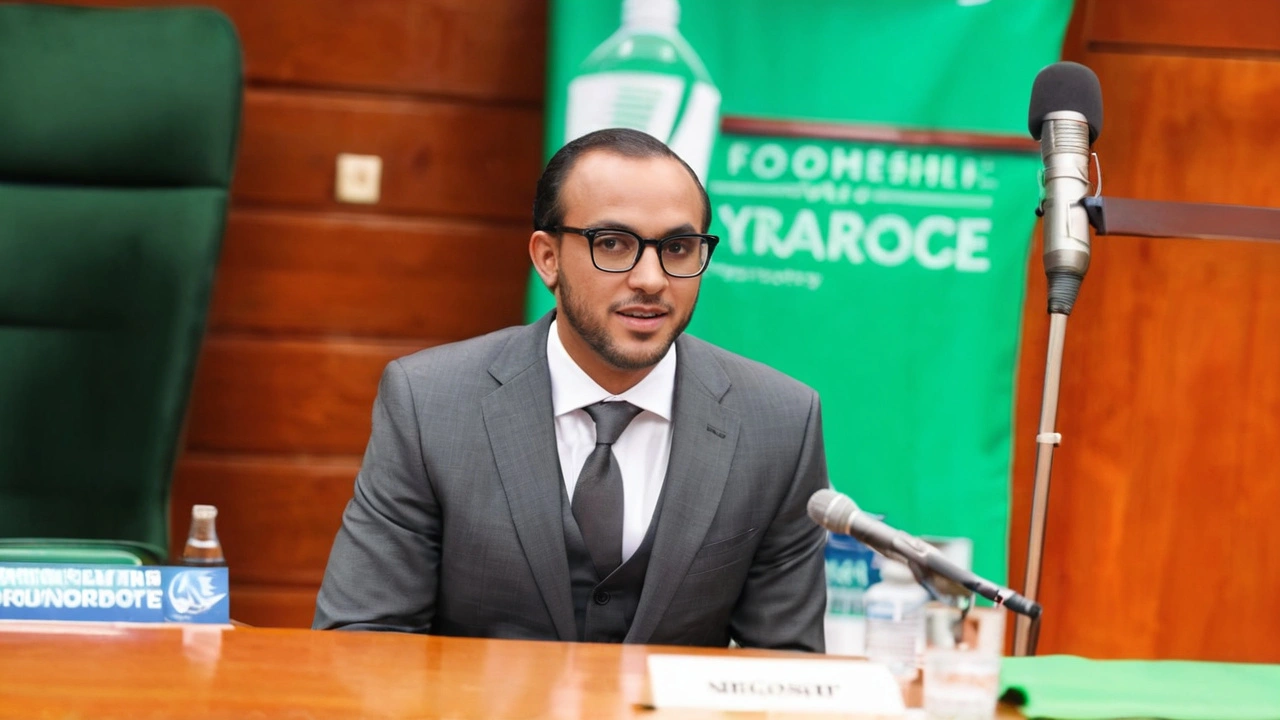Eric Muuga's Remarkable Journey: From Farmer to Cabinet Secretary Nominee
In a fascinating turn of events in Kenya's political landscape, Eric Muuga, the youngest individual ever to be nominated for the position of Cabinet Secretary, has caught the nation's attention. At the heart of his story is a refreshing tale of humility and diligence. Muuga has disclosed his impressive wealth, totaling Sh31 million. However, what's perhaps more intriguing is the fact that Muuga, despite his substantial financial success, does not own a vehicle. This remarkable disclosure underscores the unique and down-to-earth lifestyle that Muuga maintains, highlighting the virtues of dedication and simplicity.
Muuga's financial ascent is primarily rooted in agriculture. Unlike many of his contemporaries, who might have accumulated wealth through corporate ventures or political avenues, Muuga's earnings come from the land. His success story is a testament to the potential of farming and agriculture in creating significant economic opportunities. For many Kenyans, struggling with unemployment and financial instability, Muuga’s story is an inspiring reminder of the opportunities that lie within the agricultural sector.
The Impact of Agriculture on Muuga's Fortune
Muuga’s journey begins with a deep connection to the land. Engaging in farming from a young age, he quickly realized the potential within this sector. He meticulously worked his way up, investing time and effort into understanding and maximizing agricultural yields. It wasn’t long before his efforts bore fruit, literally and figuratively. As his farming ventures grew, so did his wealth. By maintaining a hands-on approach and ensuring the highest standards in his farming practices, Muuga was able to generate substantial profits, contributing significantly to his current net worth.
This revelation of his net worth being primarily sourced from farming endeavors sharply contrasts with the common narratives around wealth in Kenya. In a country where large sums are often associated with political ties or corporate success, Muuga’s financial background offers a fresh perspective. His story is a beacon of hope and encouragement to other farmers and young entrepreneurs in the nation, illustrating that wealth can indeed be harvested from the soil.
A Lifestyle of Humility
Despite his significant financial achievements, Muuga's lifestyle remains modest. The fact that he does not own a vehicle is emblematic of his grounded and humble disposition. This choice might seem unusual to many, especially those in positions of power and influence, who often equate success with material possessions. However, for Muuga, his priorities clearly lie elsewhere. Choosing to reinvest his earnings into his farming operations and community projects, rather than on personal luxuries, speaks volumes about his character and values.
Muuga’s modest lifestyle goes beyond just the absence of a vehicle; it extends to his personal habits and daily life. Known for his simplicity, Muuga’s approach towards money and success is radically different from the ostentatious display often associated with affluent individuals. This is particularly poignant in a society where wealth is frequently paraded and material success is a status symbol. In Muuga, we see a counter-narrative that emphasizes prudence, reinvestment, and community upliftment.
Public Perception and Political Implications
Muuga’s financial disclosure and lifestyle choices have stirred public interest and debate. For many Kenyans, his story is a refreshing divergence from the typical profiles of political figures. His unassuming nature, combined with a significant financial portfolio earned through hard work and dedication, is likely to endear him to the electorate. In a political environment that often grapples with issues of corruption and misuse of public funds, Muuga stands out as a beacon of transparency and integrity.
This has significant political implications. As a young nominee for the position of Cabinet Secretary, Muuga represents a new wave of leadership - one that is rooted in humility, hard work, and a genuine connection to the citizenry. His background in farming, an occupation that many voters can relate to, further strengthens his position. It paints him as an individual who understands and values the grassroots, someone who is not disconnected from the everyday struggles of ordinary Kenyans.

The Road Ahead for Eric Muuga
As Muuga steps into the political limelight, it is clear that he carries with him the hopes and aspirations of many. His story is one of perseverance, hard work, and a deep respect for the power of agriculture. It also serves as a potent reminder that success need not be accompanied by opulence. Muuga’s lifestyle choices and financial transparency are likely to set a new standard in political accountability and integrity.
The journey ahead for Eric Muuga is undoubtedly filled with challenges and opportunities. As he prepares to take on the role of Cabinet Secretary, the public will be watching closely, eager to see if his unique approach to life and wealth will translate into effective leadership and positive change for the nation. Regardless of the political outcomes, Muuga’s story has already left a significant mark on Kenya’s socio-political landscape, inspiring a new understanding of what it means to be successful and influential.


Comments (19)
The emergence of a young cabinet secretary nominee whose fortune stems from agriculture invites a nuanced examination of Kenya's evolving economic landscape. Historically, political ascendancy has often been intertwined with corporate patronage, yet this case illustrates a divergent trajectory rooted in agrarian enterprise. Eric Muuga's reported Sh31 million net worth, amassed without the conventional trappings of personal transport, underscores a deliberate reinvestment strategy focused on land productivity. By allocating capital toward modern farming techniques, he exemplifies how technological adoption can amplify yields and, consequently, profitability. Moreover, the decision to eschew automobile ownership may reflect both fiscal prudence and an intent to symbolize solidarity with rural constituents. Such symbolic gestures, while ostensibly modest, resonate profoundly within a populace that values authenticity over ostentation.
From a macroeconomic perspective, Muuga's narrative aligns with governmental objectives to diversify income sources beyond extractive industries. His success potentially catalyzes a ripple effect, encouraging nascent entrepreneurs to view agriculture not merely as subsistence but as a viable commercial venture.
It is also noteworthy that his wealth accumulation occurs amidst persistent challenges, including limited access to credit and market volatility. This suggests a level of resilience and strategic foresight that may translate into effective policy formulation should he assume office.
In terms of political optics, the juxtaposition of substantial wealth with a minimalist lifestyle offers a counterpoint to pervasive narratives of corruption. Citizens, weary of elite detachment, might perceive this as a refreshing embodiment of public service ethos.
Consequently, Muuga's trajectory could serve as a case study in aligning personal enterprise with national development goals. By channeling private success into public stewardship, the potential for synergistic growth emerges.
Nevertheless, the sustainability of such a model hinges upon transparent governance structures and equitable resource distribution.
While optimism is warranted, vigilance remains essential to ensure that personal wealth does not unduly influence policy decisions.
In sum, the confluence of agrarian wealth, youthful ambition, and a commitment to modesty offers a compelling tableau for Kenya's political future.
The notion of a farmer-turned-secretary is not merely anecdotal; it underscores the perennial dialectic between agronomy and governance. One must, however, remain circumspect about the romanticization of such narratives.
Indeed, the agricultural sector's contribution to GDP has been underappreciated for decades, and this appointment may signal a strategic pivot. 😊
Wow!!! This is the kind of story that gets you out of bed with a fire in your belly!!! A young man turning soil into wealth and then into policy-pure inspiration!!! Let's harness that momentum!!!
Oh, look at Mr. No‑Car, saving the nation one tractor ride at a time-how utterly groundbreaking that must be for the political elite. 🙄
The data points to a concerning pattern: while Muuga's wealth is lauded, the systemic barriers that prevent the majority from replicating his success remain unaddressed. This selective spotlight risks perpetuating inequities.
i think its cool but also like, how many peope can actually buy land and start a big farm? not evryone got cash.
From a philosophical standpoint, Muuga's journey epitomizes the Aristotelian virtue of moderation-balancing material success with communal responsibility. It invites us to reflect on the true purpose of wealth.
We must hold our leaders to the highest moral standards; flaunting modesty while amassing wealth can be a slippery slope toward ethical compromise.
Seems typical.
Absolutely love hearing about a leader who reinvests in the community! 🌱🚜💚
In the grand theatre of politics, one seldom witnesses a protagonist whose script is written in the language of the soil; this moment is nothing short of historic, a crescendo of hope that reverberates through the fields and the corridors alike.
The elite's narrative is a smokescreen; behind the veneer of humility lies a network of covert alliances orchestrated to consolidate power. One must question who truly benefits from this agrarian façade.
National interests demand vigilance; vanity projects cannot distract from sovereignty.
Interesting development-though I wonder if the lack of a car is a genuine choice or a calculated political image. 🤔🚗
Sure, because the biggest issue in Kenyan politics is definitely whether someone's got wheels. 🙄
Let's channel this enthusiasm into concrete policies that empower smallholder farmers across the nation! Together we can turn this momentum into lasting change.
For those interested, the Ministry of Agriculture reports a 12% annual increase in yield for farms that adopt mechanized irrigation-a statistic worth noting in this discussion.
Patriotism demands that we cultivate our land and our leaders alike; only then can we truly safeguard our nation's destiny.